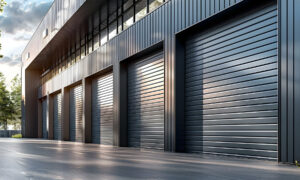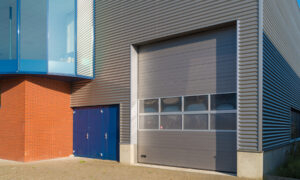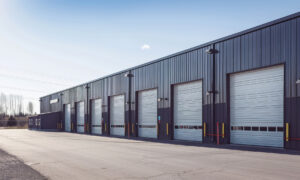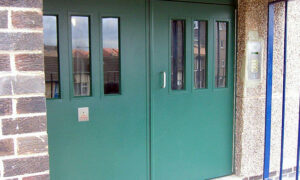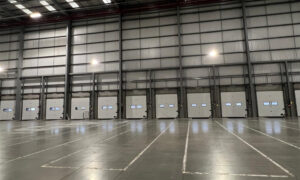Access control barriers prevent unauthorised vehicles from entering your business premises while allowing easy access for customers and personnel. They complement the secure door systems you have in place across your building.
Here, we discuss everything you need to know about traffic control barriers, including the types of barriers available and the benefits they could bring for your company.
What are access control barriers?
Access control barriers regulate the flow of vehicles into specific areas. They help to create safer and more controlled business environments.
These barriers are most commonly used in:
- Car parks
- Industrial and commercial business premises
- Toll roads
- Airports
By installing access control barriers, you improve business security. No unauthorised vehicles or personnel can access your site. You also get to control how and when vehicles move through your premises.
Types of traffic control barriers
There are several different types of traffic control barriers. Each is suited to different applications. Here are some of the most common.
1. Automatic rising arm barriers
Automatic rising arm barriers are also known as bar, post, pole, beam or boom gates.
They feature a horizontal arm that lifts and lowers to allow or restrict vehicle access. You tend to find these gates at the entrance to car parks and at toll booths.
These automatic traffic barriers are made from durable steel or aluminium and are available in a range of different lengths.
They’re operated by electricity and their movement can be triggered by sensors, keypads, remote controls or radio frequency identification (RFID) tags. You can also get license plate recognition (LPR) barriers that use cameras to admit vehicles on your authorised list.
2. Manual car park barriers
Manual car park barriers are very similar in appearance to automatic rising arm barriers. But — unlike the automatic barriers — these bars aren’t powered by electricity.
Instead, they are operated manually. You need a person on hand to lift the bar and allow vehicles to pass through. This is easier than it sounds as most manual car park barriers are counterweighted. This means a single person can lift and lower the bar with ease.
If you don’t have a member of staff available to man the barrier all day, you can lock it into place — either open or shut.
3. Sliding gates
Sliding gates are low-maintenance barriers that slide horizontally along a track, allowing vehicles to enter or exit. They’re most commonly found in industrial settings, as they accommodate large vehicles, like HGVs.
These vehicle barrier systems are useful when space is at a premium. Unlike standard gates or some of the other access barriers on this list, they don’t swing out or up. They’re also great for security as their construction makes them very difficult to force open.
Available with automatic operation, via push button, card reader, radio, keypad or intercom, sliding gates are also really easy to use.
4. Bollards
There are two types of bollards you can install at your business premises:
- Fixed bollards protect buildings and pedestrians from unauthorised vehicle access and accidents. Made from robust materials, like stainless steel, they can also prevent vehicle ram raids. These bollards are fixed in place and cannot be moved.
- Rising bollards are powered by an operator or use sensors to recognise a vehicle. They then fall to allow the vehicle to enter your premises before rising again to block the way.
5. Height restriction barriers
Height restriction barriers are another type of vehicle barrier system. They prevent larger vehicles — like heavy goods vehicles — from gaining access to your business premises. Unauthorised vehicles can’t pass through a height restriction barrier without incurring significant damage.
You can use these barriers at the entrance to your car park. You can also use them to protect the doorways and roller shutter doors in and around your workplace.
Benefits of access control barriers
Why should your business invest in access control barriers? Whether you choose automatic traffic barriers, manual car park barriers, bollards, sliding gates or height restriction barriers, here are the benefits you can expect:
1. Improved business security
When you install access control barriers around your business premises, you prevent unauthorised vehicles from gaining access.
Paired with CCTV, alarm systems, and strong, secure doors, barriers act as a deterrent against theft and vandalism — so they help to keep your business and personnel safe.
2. Traffic management
If you have a busy car park or business premises, barriers help to regulate the flow of vehicles. This reduces congestion and ensures the smooth movement of vehicles around your site.
3. Parking enforcement
If you want to charge a parking fee or create areas where parking is restricted to certain users, this is another thing traffic control barriers can help with.
4. Access tracking
You can use automatic traffic barriers to monitor who is entering and exiting your business — modern systems come with logging and reporting features. You can use this data to improve security and operations.
5. Cost efficiency
With automatic barriers guarding the entrance of your business premises, you reduce the need for on-site personnel, like security guards. You can redeploy their skills in other areas or choose to cut your personnel costs.
6. Improved business exterior
When you only allow authorised personnel to use your car parks and site thoroughfares, you reduce wear and tear. You improve your business exterior and reduce car park maintenance costs.
Key considerations when installing vehicle barrier systems
Before investing in vehicle barrier systems, it’s important to consider the following factors:
- Site requirements. Look at your site layout. Assess the space available and which access control barriers are best suited to your requirements.
- Access methods. Think about how vehicles will gain access to your premises. Will your barrier be manned? Or will you use sensors, keypads, remote control or LPR systems to open and close the vehicle barrier system?
- Integration with existing systems. A good barrier system will integrate with your other systems and security. That might include visitor management, security and logistics systems.
- Power and backup options. If you want to install automatic barriers, consider power sources and backup power options.
- Regulations. Check local regulations and standards so you know which safety requirements you will have to comply with.
- Maintenance. Like industrial or commercial doors, access control barriers require regular maintenance to ensure they remain reliable and compliant. So bear this in mind when deciding which access systems to install.
Finding the right access control barriers for your business
The right access control barriers are a cost-effective way to enhance traffic flow and improve business security. They allow you to track the movement of vehicles in and out of your premises and enforce parking or vehicle restrictions.
Ready to install or upgrade your access control system? The SDS team is here to help. Contact us today to find the perfect solution for your business.

